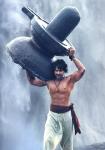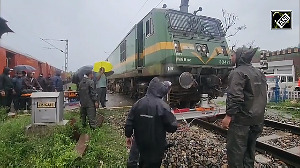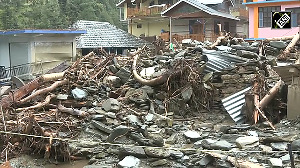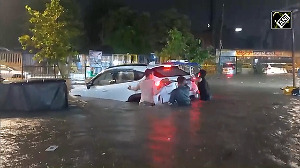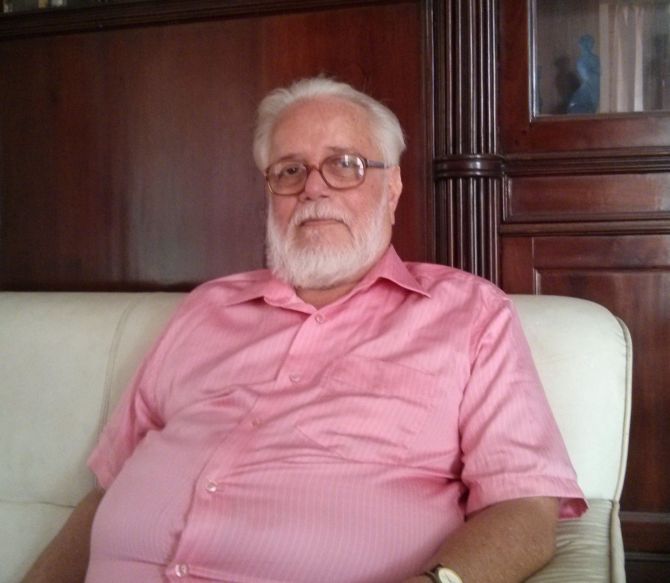
'My wife was asked to get out of an autorickshaw because she was married to me. My children were targeted and branded a traitor's children.'
'In spite of the Supreme Court and the NHRC having cleared my case, the state government is yet to close it. Local politicians are behind this. Why can't they close the case, give me compensation, accepting gracefully that they have wronged me?'
Dr S Nambi Narayanan, the scientist who was accused and then exonerated in the 1994 ISRO spying case, speaks to Rediff.com's Shobha Warrier about his continuing travails and his recent meeting with Narendra Modi.
S Nambi Narayanan, left, joined the Indian Space Research Organisation as a scientist in 1966, and was instrumental in introducing liquid fuel rocket technology in India in the early 1970s.
He and his team also developed the Vikas engine used in many ISRO rockets, including the Polar Satellite Launch Vehicle that took Chandrayaan-1 to the moon. The Vikas engine was used in the Geo-Synchronous Satellite Launch Vehicle too.
He was in charge of ISRO's cryogenics division when the ISRO espionage case broke out in 1994. Dr Nambi Narayanan was arrested by the Kerala police for allegedly passing secret documents to Pakistan.
In 1996, the Central Bureau of Investigation found the case baseless and recommended departmental action against the Intelligence Bureau and Special Investigation Team officers who had investigated the case.
Nothing of that sort has happened yet. The Supreme Court also ruled that the case was false.
Twenty years later, Dr Nambi Narayanan's fight for justice continues.
The scientist and the spy case were back in the news a few months ago when Narendra Modi, the Bharatiya Janata Party's prime ministerial candidate, met him in Thiruvananthapuram.
It was said that Modi met him because of R B Sreekumar's involvement in the ISRO spying case. Dr Nambi Narayanan had filed a suit for damages in 1999 against Sreekumar, a 1971 batch Gujarat cadre Indian Police Service officer, who was then deputed to the Intelligence Bureau and part of the SIT in the ISRO espionage case.
Sreekumar was additional director general of police (intelligence) when the Gujarat riots broke out in 2002. He later charged Modi of being involved in the riots.
On Monday February 24, Sreekumar held a press conference, accusing Modi of using Dr Nambi Narayanan to target him.
In this exclusive interview to Rediff.com's Shobha Warrier at his simple home in Thiruvananthapuram, Dr Nambi Narayanan discusses the spy scandal and reveals why he admires Narendra Modi.
Sreekumar told a press conference in Thiruvananthapuram that you were being used by Narendra Modi. How do you react to this accusation?
My question is why should Modi use me? He has no need to use me.
I want to know why this man (Sreekumar) is uttering lie after lie? He thinks people are not knowledgeable or intelligent.
In my opinion, he is desperate.
The most important thing you should know is that I filed the damage suit against Sreekumar in 1999 when Modi was not even the chief minister of Gujarat.
I have a genuine complaint against Sreekumar after his involvement in the ISRO spy case. So, it is absurd to say that Modi is using me to target him.
Why should he bring me into the picture in his fight against Modi, as my case against him did not start after I met Modi; it is 15 years old!
You met Modi in September. How did the meeting happen?
I received a call from somebody in the BJP, asking me if I was willing to meet Modi, who wanted to see me. I said, 'Why not?' I was asked to meet him at the Hotel Mascot in Thiruvananthapuram at 9.30 in the night.
As I passed through several layers of security, I asked myself, 'What could the reason for this meeting be?'
Did you think Sreekumar was the reason behind the meeting?
That was what came to my mind first. I could only think of Sreekumar as the reason behind the call.
Surprisingly, when I met Modi, he did not utter a single word about Sreekumar. He asked me why my case is getting prolonged for so long. He said, 'I understand that it has been more than 19 years.'
I told him that it was because of the games played by various political parties that it was still going on.
I told him that it was a false case foisted by both the coalition fronts (the Left Democratic Front and the United Democratic Front) in Kerala, as was established by the CBI.
Neither coalition wanted to admit the error in their judgment, as it was a matter of prestige for both.
I was not able to fight my way through, as they were both involved in it.
I told Modi what the CBI had found, and what the Supreme Court's ruling was.
The CBI had asked the state government to take action against the police officers, but they sat on it without divulging what they were doing about it.
When the Kerala government wanted to go ahead with the case even after that, the court quashed it with heavy strictures.
I also told him about the compensation that I have demanded from the state and Union governments.
In 2001, the National Human Rights Commission gave me a compensation of Rs 10 lakh (Rs 1 million) to be released with immediate effect. But I was given the amount by the state government in 2012, after 11 years.
I told Modi everything about the case briefly and said I wanted justice.
Was Modi knowledgeable about the case?
Apparently, he was briefed well, but wanted to hear the story from me. Otherwise, why would he ask for a meeting with me?
When we met, I did all the talking, while he was trying to understand why this man was fighting the mighty state and Union governments for 20 years.
Did he make any comments?
He listened to me all the time, and after I finished, he said, 'Nambisaab, it will not be like this all the time. I wish you success.'
What did you feel after meeting him?
I came out of the room full of admiration for Modi. Somebody from the media asked me later, 'Why did you meet a chief minister from Gujarat?' I asked him, 'Why not? Kerala has had five chief ministers -- K Karunakaran, A K Antony, E K Nayanar, V Achuthanadan and Oommen Chandy -- since the case broke out, but not even one chief minister had the courtesy to talk to me.'
But somebody from Gujarat showed an interest in meeting me and hearing my story. I felt great about it.
If he had any political motive in meeting me, he would have done so in the public glare. But instead, he met me quietly at 9:30 pm, and he issued no press statement about the meeting.
Has your opinion of Modi changed after meeting him in person?
I had no special feeling for him, but I knew he was a go-getter.
My only appreciation of him was Gujarat is the only state in India where prohibition is in force while every other state is dependent on the income from liquor.
That shows the will power of the person and it also shows that you can run a state without selling liquor.
I am also impressed with the excess power generation and the low unemployment rate in Gujarat.
I feel the country will be safe in Modi's hands.
Power generation and agricultural development will flourish under him, and this in turn will lead to employment generation.
I am also impressed with his thrust on manufacturing, which will help us compete with China.
I think the two countries that will dominate the world in future are India and China, and his thrust on manufacturing will give us an edge over China as we are a country that has the advantage of knowing English.
When the spy case broke out, you spoke of the role of the Central Intelligence Agency in the case. Why did you say so?
I didn't mention the CIA by name. I said a foreign force was involved. (Then prime minister) P V Narasimha Rao also made a statement in Parliament about this. It could be the CIA or somebody else.
Just think, this spy case was initiated by a circle inspector! But it ended in the Supreme Court.
You don't see the foreign hand in the whole episode; it was invisible.
That's why I said it was a conspiracy. I was instrumental in bringing liquid propulsion systems to India. I had signed an agreement with the Russians for cryogenic technology in 1991.
We were supposed to finish the entire program by 1999. But the target was achieved only in 2014.
In 1993 itself, the world knew we would become a competitor in the commercial use of the technology. At that time, the Americans and the French were dominating the scene. Russia, China and Japan also were using the technology but not commercially.
Our price was half of what the Americans and the French were quoting, and the business was worth $300 billion. Naturally, somebody didn't want us to develop the technology.
Do you blame the media for sensationalising the issue without proper verification?
The vernacular media, starved of news, played a major role in sensationalising the case. They played into the hands of the police; they believed whatever the police said.
When they realised what the truth was, they started supporting me.
The funny thing was, at that time, we had not developed cryogenic technology. How can you sell a non-existent technology? They talk about us passing on the drawings. But we pass the drawings on to all the fabricators.
We must have given the drawings to a thousand people. So, what's there to pass on? There was something fishy in the whole thing.
It was very traumatic. The questioning by the state police was very cruel until the CBI came into the picture.
How did you cope when everyone called you a traitor?
First, I was upset. I could not understand what was going on. I would never have dreamt of something like that happening to me. It was very difficult to digest when society pointed the finger at me.
My wife was asked to get out of an autorickshaw because she was married to me. Even my children were targeted and they were branded a traitor's children. So many such disgraceful incidents happened.
What helped you remain sane?
My staunch belief in God. I am a god-fearing person, and I go to the temple every day. In fact, my day starts by going to a temple.
I believed that I would come out of this unscathed, as I had committed no crime, and I did.
Today, wherever I go, people give me more respect. Perhaps they feel guilty for suspecting me of being a traitor.
Modi told you it wouldn't be like this forever. Do you expect to receive justice if he became the prime minister?
I can't predict it. Whether Modi comes to power or not, I will continue my fight in the hope that justice will be given to me.
In spite of the Supreme Court and the NHRC having cleared my case, the state government is yet to close it.
Local politicians are behind this. Why can't they close the case, give me compensation, accepting gracefully that they have wronged me?
Yes, I do have a hope that if Modi gets a chance to voice his opinion on this, he will do so at the appropriate time.
When we met, I got the feeling that he was genuinely interested in what had happened to me.
It was not necessary for him to devote his precious time to me, but he saw to it that he met me. He listened to me intently without interrupting, and he appeared disturbed upon hearing the whole story.
I was not an admirer of Modi. But after meeting him, I have developed an admiration for him because I felt, 'Here's a person who is concerned about a matter of national importance.'
This issue has nothing to do with Gujarat or Kerala; it is a national issue. He asked me specifically about the involvement of a foreign country.
That is why I feel the country as a whole will be safe in his hands.
Photograph of Dr S Nambi Narayanan: Shobha Warrier/Rediff.com








